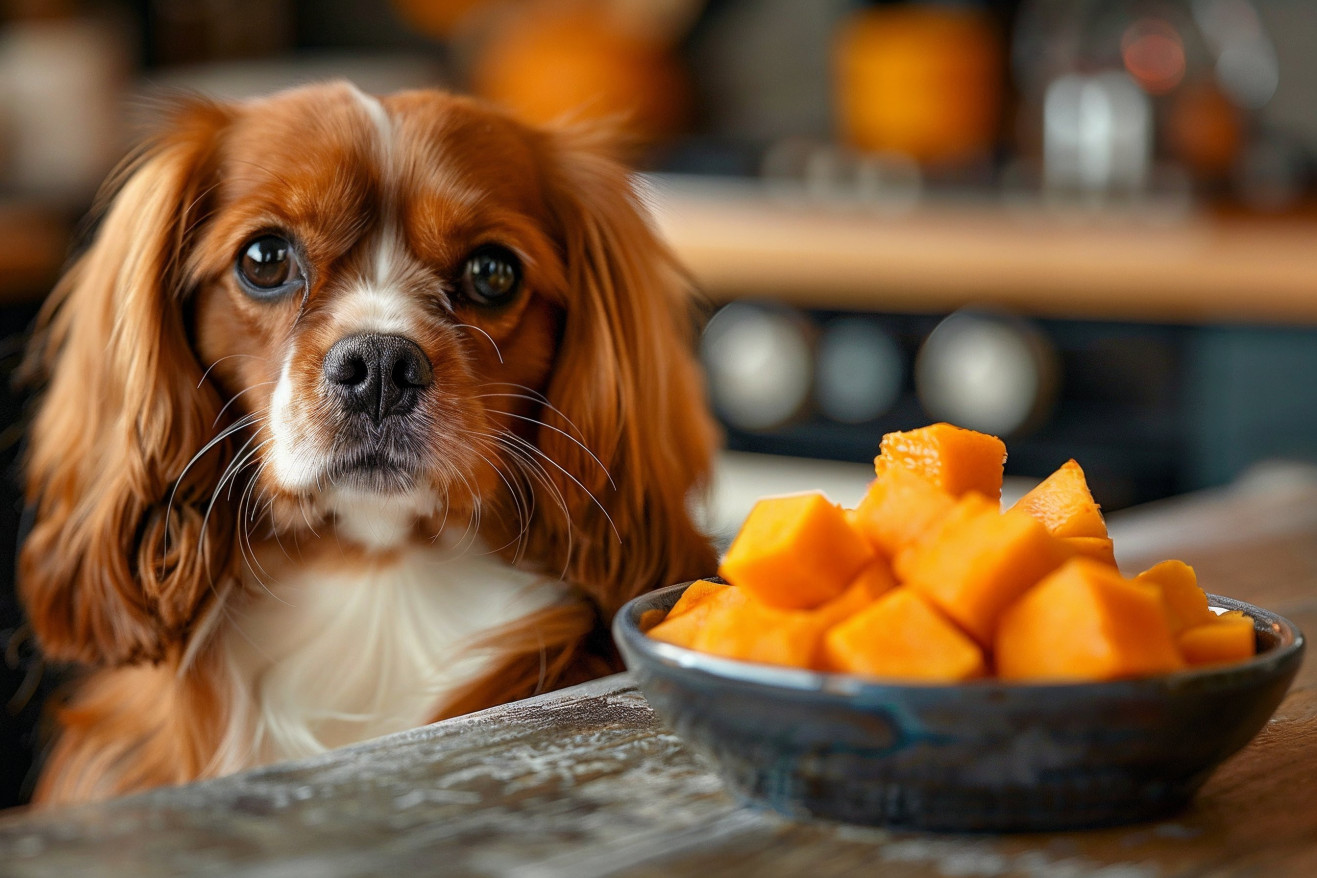Can Dogs Eat Butternut Squash? Uses & Feeding Tips
11 March 2024 • Updated 11 March 2024

Butternut squash is often referred to as a superfood, but does that mean it’s just as good for our dogs as it is for us? Butternut squash is a great source of vitamins A, C, and E, essential minerals, and dietary fiber, all of which can be good for your dog.
It can help with digestion and even strengthen your dog’s immune system. To make sure it’s healthy and safe for your dog, make sure you feed them cooked and peeled butternut squash in moderation and without the seeds.
To help you better understand this, we’ll cover a variety of trusted veterinary perspectives, nutritional breakdowns, and research on the canine diet. These references will help explain the benefits and best ways to prepare butternut squash for dogs.
This will help you understand how to best incorporate butternut squash into your dog’s diet to help improve their health, while also covering any potential downsides. By the end of this article, you’ll have the knowledge you need to decide whether or not to add this delicious squash to your dog’s diet.
Can dogs eat butternut squash?
What Makes Butternut Squash a Superfood for Dogs?
Butternut squash is so much more than a staple in fall dishes. It’s also a nutritional powerhouse for dogs. When served cooked and plain, this orange-fleshed fruit is packed with vitamins that are essential for your dog’s well-being.
According to Pure Pet Food, butternut squash is a great source of vitamins A and C, which support healthy development, strong muscles, and clear eyesight. Meanwhile, the vitamin E in butternut squash is an antioxidant that supports your dog’s immune system and general health.
The fruit’s mineral profile is just as impressive. As Raw Bistro points out, butternut squash is a source of minerals like potassium, which supports muscle and nerve function, and magnesium, which is important for bone health and enzyme activity.
And that’s not to mention the fruit’s dietary fiber, which Pure Pet Food and Raw Bistro both call out as important for supporting good digestive health in dogs and helping with issues like constipation and diarrhea.
The fact that butternut squash is an antioxidant-rich food only adds to its superfood status. Antioxidants help fight inflammation and oxidative stress, which may reduce the risk of chronic disease. With all of these nutritional benefits, butternut squash is a great way to supplement your dog’s diet, providing more than just a delicious snack.
How to Safely Feed Butternut Squash to Your Dog
While butternut squash can be a healthy addition to your dog’s diet, it’s important to remember that like all foods, it should be fed in moderation and introduced properly.
The American Kennel Club recommends starting with small amounts to make sure your dog’s system doesn’t have any adverse reactions. You can start by adding a tablespoon of cooked, pureed butternut squash to your dog’s regular meal and then increasing the amount based on their response and size.
For example, a couple of tablespoons may be enough for a small dog, while a larger dog may be able to eat up to a quarter of a cup, according to Sundays for Dogs.
Butternut squash can also be a good way to help dogs who are on a diet lose weight. The fiber in butternut squash can help dogs feel full without consuming a lot of calories. That said, it’s important to talk to your vet before making any changes to your dog’s diet, especially if you’re trying to help them lose weight, according to the American Kennel Club.
If your dog has dietary restrictions, you can use substitutes like pureed pumpkin or cooked zucchini. Both of these options are high in fiber and offer many of the same digestive benefits as butternut squash without the starch.
As with any new food, make sure to introduce butternut squash slowly and watch for any changes in your dog’s digestion or behavior. If you notice anything concerning, make sure to talk to your vet right away.
Mindful Measures: Risks and Precautions of Butternut Squash
While butternut squash can be a healthy part of a dog’s diet, there are some risks and precautions to keep in mind. According to Pure Pet Food, butternut squash is not toxic, but it is hard and fibrous in its raw form, which can make it difficult for dogs to chew and digest.
This can lead to gastrointestinal issues like stomach pain, vomiting, or diarrhea. To avoid this, it’s best to cook the squash until it’s soft so that it’s easier for dogs to eat and digest.
It’s also important to remove the seeds and skin from the squash, as these can be choking hazards. Dr. Andrew Miller MRCVS of Pure Pet Food explains that while the seeds aren’t toxic, they can cause blockages, so it’s best to serve them to dogs in a baked and blended form.
In addition, dogs that eat too much butternut squash can develop vitamin A toxicity. As a result, Dr. Miller recommends feeding dogs butternut squash in moderation to avoid illness, noting that treats like butternut squash should make up no more than 10% of a dog’s daily calorie intake.
Keep an eye out for any signs of an adverse reaction, such as changes in your dog’s stool or appetite, and contact your vet if you have any concerns. These risks and precautions highlight the importance of a well-rounded diet for our furry friends.
What Do Vegetables Do in a Dog’s Diet?
Dogs need a balanced diet that includes essential nutrients like proteins, fats, carbohydrates, vitamins, and minerals to be healthy. VCA Animal Hospitals explains that, although dogs are omnivores and can eat both animal and plant material, the source and digestibility of these nutrients is key. Vegetables like butternut squash can provide important vitamins, minerals, and fiber and can help balance out the animal-based proteins in a dog’s diet.
PetMD notes that vegetables are also important for providing complex carbohydrates that are easily digestible and can be a good source of energy when they’re cooked. This is especially important when you consider that dogs need a variety of foods in their diet to be healthy beyond just animal proteins.
There are still many myths about dogs and their consumption of vegetables, including the idea that dogs are carnivores and should eat a diet that’s primarily made up of meat. However, Purdue’s Canine Welfare Science Center explains that a balanced diet is important for supporting metabolic functions and preventing disease, and vegetables are important for helping to ensure that balance and that dogs get all the nutrients they need to be healthy.
By understanding these nutritional requirements and including some plant-based foods, like butternut squash, in their dog’s diet, pet parents can help ensure that their dogs get the balanced, nutritious diet they need.
How to Prepare Butternut Squash for Your Dog
You can give your dog the gift of a healthy snack in the form of butternut squash if you prepare it correctly. According to Recipes.net, the first step is to preheat your oven to 400°F (200°C).
After that, make sure to wash the squash thoroughly. Then, using a sharp knife and a stable surface, cut off the ends with a steady hand. A vegetable peeler can help you remove the thick skin more easily.
After that, remove the insides and seedswhich you should throw away to avoid any potential digestive issues, according to Bella & Dukeand cut the remaining flesh into small pieces.
You’ll need to cook the squash to ensure that it’s safe for dogs to eat. You can either steam the pieces for 10–15 minutes or roast them on a baking sheet lined with parchment paper with a little water or low-sodium vegetable broth for 25–30 minutes until they’re soft and easy to eat.
Once they’re cooked and cooled, you can mix them in with your dog’s kibble or mix them with wet food. For a special treat, freeze small portions of the cooked squash for a cool, refreshing snack.
As always, remember that it’s important to keep everything in moderation and to talk to your vet about any new additions to your dog’s diet. With these simple steps, you can safely add butternut squash to your dog’s diet.
The Takeaway: Butternut Squash as a Canine Superfood
Butternut squash is shown to be a superfood for dogs, packed with important vitamins, minerals, and fiber. This nutritional profile can help improve immune function, digestive health, and even the look of a dog’s coat.
Both The Wildest and the American Kennel Club stress the importance of feeding dogs cooked, plain butternut squash to help with digestion and to avoid gas and other digestive issues. It’s also important to make sure that the skin and seeds are removed to prevent choking and to feed it in moderation to avoid an imbalance of nutrients.
As always, it’s important to talk to your vet before adding butternut squash to your dog’s diet to make sure it works with their specific nutritional needs. In summary, butternut squash’s place in a dog’s healthy diet is clear: when prepared and fed correctly, it can be a tasty and nutritious addition to your dog’s meals.


